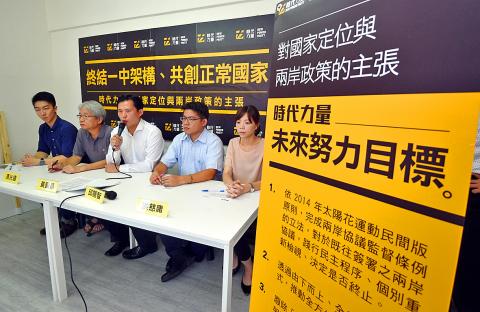The New Power Party (NPP) yesterday said its cross-strait policy would focus on demonstrating that Taiwan and China are two separate nations, while amending laws according to the cross-strait factual “status quo.”
“Chinese Nationalist Party [KMT] presidential hopeful Hung Hsiu-chu [洪秀柱] earlier proposed her ‘one China, same interpretation’ model, while President Ma Ying-jeou [馬英九] insists on ‘one China, with each side having its own interpretation,’ and KMT Chairman Eric Chu [朱立倫] said that the two sides of the Taiwan Strait both belong to ‘one China,’” NPP Acting President Huang Kuo-chang (黃國昌) told a news conference.
“Although their ideas might be slightly different, all sit under the framework of ‘one China,’ which is against the principles of national sovereignty and constitutional democracy, because Taiwan’s sovereignty belongs to the 23 million people of Taiwan, not to anyone in China,” he added.

Photo: Lo Pei-der, Taipei Times
Huang acknowledged that constitutional amendments define Taiwan as the free area of the Republic of China (ROC) and China as the mainland area of the ROC.
However, “it is clear that our sovereignty and jurisdiction do not cover the People’s Republic of China [PRC], so Taiwan and China are in a nation-to-nation relationship,” he added.
Justin Wu (吳崢), the chief executive director of NPP legislative candidate Freddy Lim’s (林昶佐) campaign office, said that the transition must begin with changing the Constitution.
“No one believes in the Constitution; it is outdated and full of defects, and is more like a fairy tale, because it denies the existence of the PRC, saying that it is the ‘mainland area’ of the ROC,” Wu said. “It is just so far from the facts.”
The 25-year-old political activist said that since birth, he and his colleagues have known their nation only as Taiwan, so China for them is just another foreign country.
Therefore, it is crucial to amend the Constitution to be in accordance with the facts, he said.
Reporters asked whether Huang would join the legislative race by running for district representation or as an at-large legislator in the Democratic Progressive Party (DPP).
Huang said that since he said last month that he would not run for the constituency in New Taipei City’s Sijhih District (汐止), he has not had any new thoughts about running.
When pressed on whether he would join the DPP as an at-large legislator, Huang said: “Impossible.”
“As an NPP member, I would maintain a competitive yet cooperative relationship with the DPP; we would strive to be the second-largest Taiwan-centric political party, with the goal to smash the KMT,” Huang said. “Therefore, it is impossible for me to join the DPP as an at-large legislator.”
The question stemmed from a call by the Taiwan Society North advocacy group urging members of all smaller pro-independence parties to join the DPP to endeavor for at-large seats.

A preclearance service to facilitate entry for people traveling to select airports in Japan would be available from Thursday next week to Feb. 25 at Taiwan Taoyuan International Airport, Taoyuan International Airport Corp (TIAC) said on Tuesday. The service was first made available to Taiwanese travelers throughout the winter vacation of 2024 and during the Lunar New Year holiday. In addition to flights to the Japanese cities of Hakodate, Asahikawa, Akita, Sendai, Niigata, Okayama, Takamatsu, Kumamoto and Kagoshima, the service would be available to travelers to Kobe and Oita. The service can be accessed by passengers of 15 flight routes operated by

GIVE AND TAKE: Blood demand continues to rise each year, while fewer young donors are available due to the nation’s falling birthrate, a doctor said Blood donors can redeem points earned from donations to obtain limited edition Formosan black bear travel mugs, the Kaohsiung Blood Center said yesterday, as it announced a goal of stocking 20,000 units of blood prior to the Lunar New Year. The last month of the lunar year is National Blood Donation Month, when local centers seek to stockpile blood for use during the Lunar New Year holiday. The blood demand in southern Taiwan — including Tainan and Kaohsiung, as well as Chiayi, Pingtung, Penghu and Taitung counties — is about 2,000 units per day, the center said. The donation campaign aims to boost

ENHANCING EFFICIENCY: The apron can accommodate 16 airplanes overnight at Taoyuan airport while work on the third runway continues, the transport minister said A new temporary overnight parking apron at Taiwan Taoyuan International Airport is to start operating on Friday next week to boost operational efficiency while the third runway is being constructed, the Ministry of Transportation and Communications said yesterday. The apron — one of the crucial projects in the construction of the third runway — can accommodate 16 aircraft overnight at the nation’s largest international airport, Minister of Transportation and Communications Chen Shih-kai (陳世凱) told reporters while inspecting the new facility yesterday morning. Aside from providing the airport operator with greater flexibility in aircraft parking during the third runway construction,

American climber Alex Honnold is to attempt a free climb of Taipei 101 today at 9am, with traffic closures around the skyscraper. To accommodate the climb attempt and filming, the Taipei Department of Transportation said traffic controls would be enforced around the Taipei 101 area. If weather conditions delay the climb, the restrictions would be pushed back to tomorrow. Traffic controls would be in place today from 7am to 11am around the Taipei 101 area, the department said. Songzhi Road would be fully closed in both directions between Songlian Road and Xinyi Road Sec 5, it said, adding that bidirectional traffic controls would